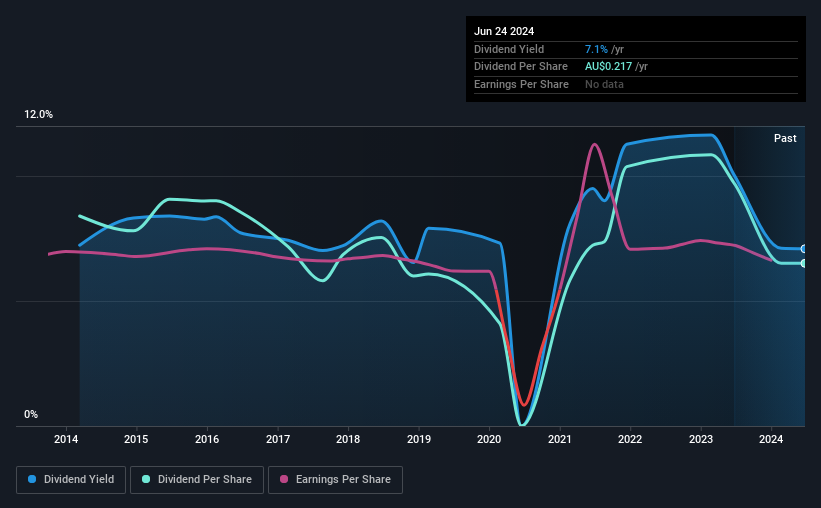Reef Casino Trust's (ASX:RCT) Dividend Is Being Reduced To A$0.0824
The board of Reef Casino Trust (ASX:RCT) has announced it will be reducing its dividend by 13% from last year's payment of A$0.0944 on the 11th of September, with shareholders receiving A$0.0824. However, the dividend yield of 7.1% is still a decent boost to shareholder returns.
Check out our latest analysis for Reef Casino Trust
Reef Casino Trust's Earnings Easily Cover The Distributions
If the payments aren't sustainable, a high yield for a few years won't matter that much. Prior to this announcement, the company was paying out 101% of what it was earning, however the dividend was quite comfortably covered by free cash flows at a cash payout ratio of only 55%. Healthy cash flows are always a positive sign, especially when they quite easily cover the dividend.
Earnings per share could rise by 1.2% over the next year if things go the same way as they have for the last few years. If the dividend continues along recent trends, we estimate the payout ratio could reach 93%, which is on the higher side, but certainly still feasible.
Dividend Volatility
While the company has been paying a dividend for a long time, it has cut the dividend at least once in the last 10 years. The annual payment during the last 10 years was A$0.28 in 2014, and the most recent fiscal year payment was A$0.217. This works out to be a decline of approximately 2.5% per year over that time. Declining dividends isn't generally what we look for as they can indicate that the company is running into some challenges.
Dividend Growth May Be Hard To Achieve
Growing earnings per share could be a mitigating factor when considering the past fluctuations in the dividend. However, Reef Casino Trust's EPS was effectively flat over the past five years, which could stop the company from paying more every year. So the company has struggled to grow its EPS yet it's still paying out 101% of its earnings. As they say in finance, 'past performance is not indicative of future performance', but we are not confident a company with limited earnings growth and a high payout ratio will be a star dividend-payer over the next decade.
In Summary
Overall, the dividend looks like it may have been a bit high, which explains why it has now been cut. In the past, the payments have been unstable, but over the short term the dividend could be reliable, with the company generating enough cash to cover it. This company is not in the top tier of income providing stocks.
It's important to note that companies having a consistent dividend policy will generate greater investor confidence than those having an erratic one. Still, investors need to consider a host of other factors, apart from dividend payments, when analysing a company. For example, we've picked out 3 warning signs for Reef Casino Trust that investors should know about before committing capital to this stock. Is Reef Casino Trust not quite the opportunity you were looking for? Why not check out our selection of top dividend stocks.
Have feedback on this article? Concerned about the content? Get in touch with us directly. Alternatively, email editorial-team (at) simplywallst.com.
This article by Simply Wall St is general in nature. We provide commentary based on historical data and analyst forecasts only using an unbiased methodology and our articles are not intended to be financial advice. It does not constitute a recommendation to buy or sell any stock, and does not take account of your objectives, or your financial situation. We aim to bring you long-term focused analysis driven by fundamental data. Note that our analysis may not factor in the latest price-sensitive company announcements or qualitative material. Simply Wall St has no position in any stocks mentioned.
Have feedback on this article? Concerned about the content? Get in touch with us directly. Alternatively, email editorial-team@simplywallst.com

 Yahoo Finance
Yahoo Finance 
